Du vet förmodligen redan att WordPress driver över 43% av alla webbplatser på internet. Det är ganska imponerande, men det är inte det enda open source innehållshanteringssystem (CMS) där ute. Det finns några andra alternativ värda att utforska.
När vi först började bygga webbplatser, gjorde vi en djupdykning i andra populära plattformar som Joomla och Drupal. Och även om vi alltid har föredragit att använda WordPress för alla våra projekt, förstår vi att vissa av er kanske letar efter något annat.
I den här artikeln kommer vi att jämföra WordPress vs Joomla vs Drupal. Vi kommer att förklara vad vi gillar och vad vi inte gillar för att hjälpa dig att bestämma vilken som kan vara den bästa passformen för dina specifika behov.
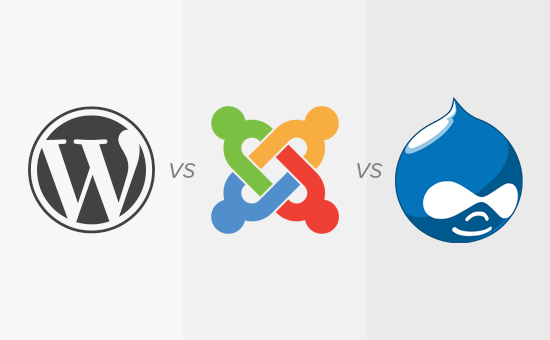
Notera: Vi jämför WordPress.org och inte WordPress.com hostingtjänst. Se vår guide om skillnaden mellan WordPress.org och WordPress.com.
Vad är gemensamt för WordPress, Joomla och Drupal
Alla tre av webbens mest populära CMS:er har mycket gemensamt när det gäller teknik, filosofi och community.
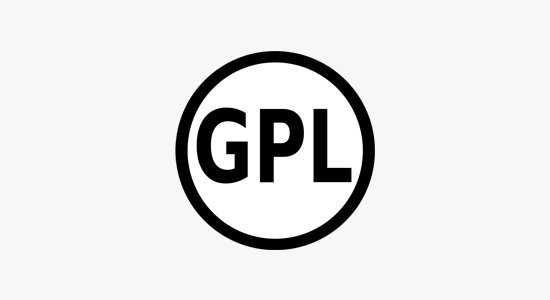
- WordPress, Joomla och Drupal är alla gratis och open source-mjukvara licensierad under GPL. Se vår artikel om varför WordPress är gratis för att lära dig mer om gratis mjukvara.
- Alla tre är skrivna primärt i PHP.
- De stöder alla MySQL som sitt databashanteringssystem. WordPress stöder enbart MySQL, medan Joomla och Drupal stöder andra databashanteringssystem.
- Alla tre använder teman och mallar för webbplatsers visuella utseende, och plugins, moduler eller tillägg för att utöka funktioner.
- Som öppen källkod är de alla community-drivna projekt.
Även om det finns många likheter, skiljer de sig åt på många sätt.
Till exempel har de olika policyer för vad som ska inkluderas i kärnprogramvaran, hur moduler och mallar ska hanteras, hur säkerhet ska hanteras, etc.
Dessa skillnader har stor inverkan på användarna och hur de bygger sina webbplatser.
Med det sagt, låt oss titta på hur WordPress, Joomla och Drupal jämförs med varandra, så att du kan välja den bästa webbplatsbyggarplattformen för din verksamhet.
Enkelhet och nybörjarvänlighet
De flesta som skapar sina webbplatser är inte webbutvecklare, designers eller programmerare. De är vanliga användare som bara vill bygga en webbplats. Användarvänlighet är den viktigaste faktorn för majoriteten av användarna.
WordPress
WordPress levereras med en berömd fem minuters installation. De flesta WordPress-värdar erbjuder också en-klicksinstallation av WordPress. Detta gör det ganska enkelt för en ny användare att starta en WordPress-blogg eller webbplats på några minuter, inte timmar.
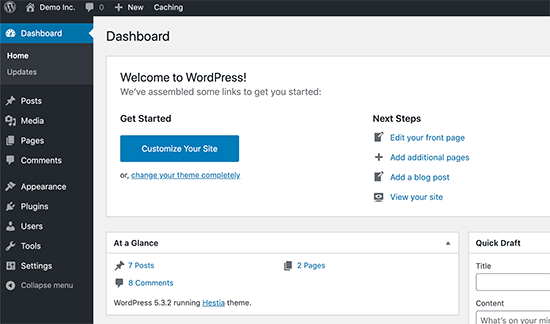
Användarupplevelsen efter installationen av WordPress är mycket bättre än Joomla eller Drupal. Användaren ser ett enkelt, tydligt användargränssnitt med menyer för att skapa inlägg och sidor eller börja anpassa utseende och teman.
Joomla
Joomla-installationen kanske inte ser lika snabb ut som WordPress, men den har mycket liknande steg. Dessutom erbjuder många leverantörer av delad hosting även paket med ett klick för Joomla-installation.
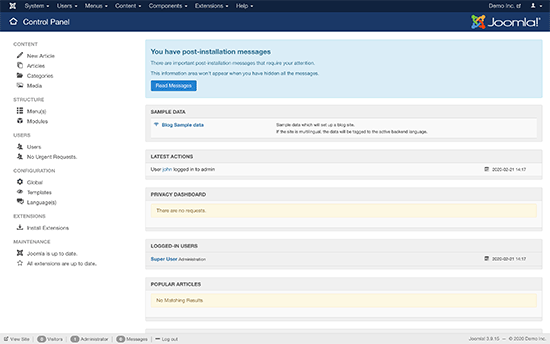
Efter installationen landar användaren på en kontrollpanel som inte är lika enkel som WordPress. Det finns alldeles för många menyer att klicka på för att anpassa webbplatsen.
Joomla-fans skulle säga att det beror på att Joomla är mycket kraftfullare än WordPress, men det tror vi inte på.
Drupal
Drupals installation liknar både Joomla och WordPress. Ladda bara ner och ladda upp paketet och kör installationsskriptet.
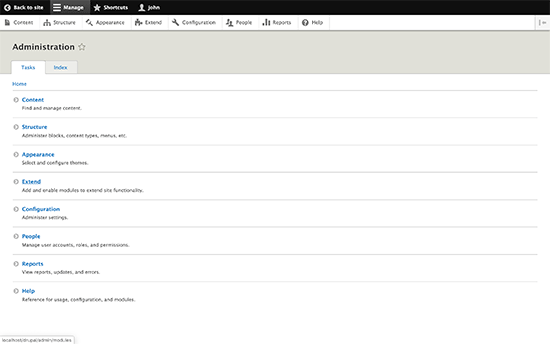
Drupal erbjuder också distributioner. Dessa är förpackade Drupal-paket med moduler och konfigurationer för att skapa specifika typer av webbplatser.
Upplevelsen efter installationen för absoluta nybörjare är lite komplicerad. Användare kommer att ha svårt att lista ut hur man ändrar saker på sin webbplats. Drupal gör det mycket tydligt hur man lägger till innehåll, men att ändra utseende och lägga till element som inte är innehåll är inte särskilt tydligt.
Vinnare: WordPress
Teman och tillägg
Alla dessa tre populära CMS levereras med teman och plugins/moduler som ett sätt att utöka programvarans funktioner och utseende.
Teman styr utseendet på din webbplats och hur den ser ut för dina användare. Plugins eller moduler är som appar för ditt CMS.
Låt oss se hur dessa tre stora CMS-program presterar i den här kategorin.
WordPress
WordPress tillåter användare att ändra utseendet på sin webbplats med hjälp av teman. WordPress levereras med några standardteman förinstallerade.
När som helst kan du klicka på knappen "lägg till ny" på din "Utseende"-sida och installera gratis WordPress-teman från den officiella WordPress.org-temakatalogen.

Förutom gratis teman hittar du många fler premium WordPress-teman utvecklade av tredjeparts temabutiker som StudioPress, Elegant Themes, och fler. Dessa är betalda teman och kommer med premium supportalternativ.
Den verkliga kraften i WordPress ligger i plugins. Det finns över 59 000 WordPress-plugins tillgängliga gratis i den officiella WordPress-plugin-katalogen. Du kan också köpa premium-plugins som kommer med betald support från plugin-utvecklare. Kolla in vår lista över måste-ha WordPress-plugins för att se hur plugins gör WordPress fantastiskt.
Joomla
Precis som WordPress levereras Joomla med mallar och tillägg. Dessa fantastiska tillägg kan göra nästan vad som helst, från att skapa en e-handelsbutik till att hantera e-post.
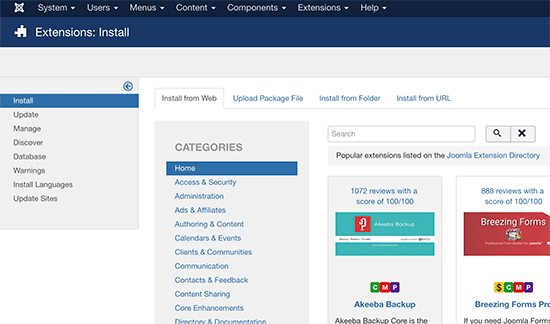
Dock är mängden av dessa mallar och tillägg inte lika hög som för WordPress. Detta kan göra det lite svårt att hitta den perfekta mallen och de perfekta tilläggen.
Som standard har Joomla ingen funktion som tillåter användare att söka efter och installera tillägg eller mallar från administrationsområdet. Det finns ett tillägg som låter dig lägga till en "installera från webben"-funktion för tillägg. Men för mallar måste användare fortfarande manuellt söka efter mallar och sedan installera dem genom att lägga till deras URL.
Drupal
Drupal har samma problem med tillgängligheten av teman och moduler. Användare måste lämna sin webbplats, söka efter den modul och det tema de vill lägga till, och sedan hitta projektets zip-fils URL. Slutligen kan de ange URL:en på sidan Moduler eller Teman för att installera dem.
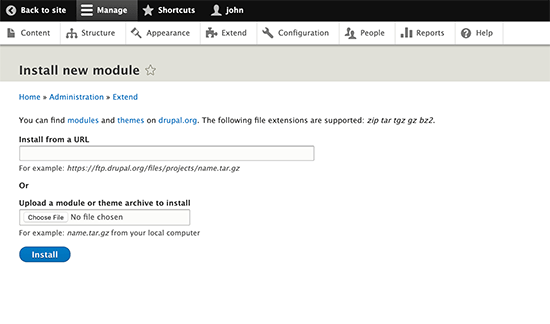
Det finns moduler för att göra nästan vad som helst, och nya läggs till regelbundet. Ändå saknas den totala mängden moduler jämfört med WordPress.
Vinnare: WordPress.
Supportalternativ
Tillgängligheten av hjälp- och supportalternativ är mycket viktig för nybörjare. Det kommer säkert att finnas några hinder när du provar ny programvara. Det är okej så länge du kan få hjälp.
WordPress
WordPress har en stark användargemenskap. Du kan hitta hjälp för WordPress på officiella supportforum, dokumentation, handböcker, kodex, Slack-kanaler, Stack Exchange, WPBeginner Engage Facebook-grupp, och nästan alla forum på internet om webbdesign och utveckling.
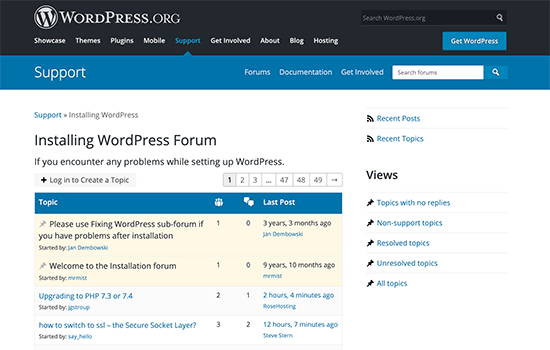
Det finns webbplatser som WPBeginner, som innehåller hundratals handledningar, videohandledningar och artiklar som riktar sig till nybörjarnivå WordPress-användare. Det finns många sätt att be om gratis WordPress-support och få den.
Förutom gratis supportalternativ finns det även sätt att få betald support för WordPress.
Online-plattformar som Codeable, Upwork och Fiverr är bara några av de platser där du kan anlita WordPress-proffs för att hjälpa dig.
På grund av WordPress enorma popularitet är det enkelt och prisvärt för småföretag och privatpersoner att hitta WordPress-utvecklare.
Joomla
Joomla, liksom WordPress, har en stor och mycket hjälpsam community. Joomla-webbplatsen har omfattande dokumentation, vilket är en värdefull resurs för nybörjare. För mer interaktivt stöd kan användare gå med i forum, e-postlistor, användargrupper, etc.
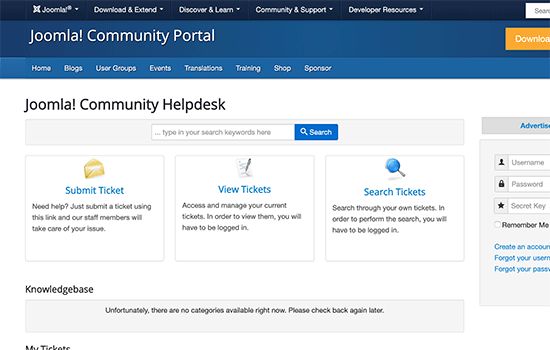
Förutom community-support finns det tredjepartsresurser, betald utbildning och utvecklingsbyråer som kan vara till hjälp.
Till skillnad från WordPress är det ganska svårt att hitta prisvärd expert hjälp för Joomla. Att anlita en utvecklare eller expert för Joomla-utveckling, felsökning eller assistans kan kosta betydligt mer än WordPress.
Drupal
Drupal har en mycket proaktiv gemenskap av fans och användare. Liksom WordPress och Joomla hittar du alla community-supportalternativ för Drupal. Det finns omfattande dokumentation, ett supportforum, e-postlistor, användargrupper och IRC-chattrum – alla bra ställen att få råd och gratis hjälp.
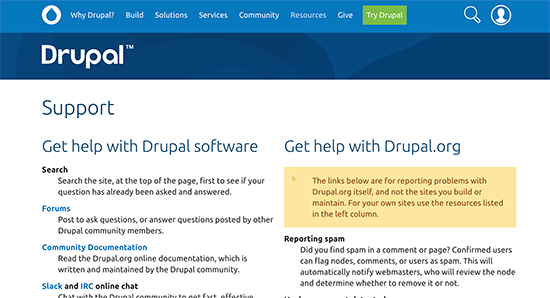
Drupal försöker koppla samman användare med utvecklare och företag som erbjuder professionella Drupal-tjänster. Du kan hitta dem på Drupal Marketplace.
Däremot är Drupal-utvecklare, liksom Joomla, mycket dyra jämfört med WordPress.
Vinnare: WordPress
Lokalisering & Flerspråkigt stöd
En stor andel av de webbplatser som skapas varje dag är icke-engelska eller flerspråkiga webbplatser. Det är mycket mer troligt att många nybörjare förmodligen skulle leta efter ett CMS som kan hantera flera språk eller har stöd för olika lokaler och språk.
WordPress
WordPress gör ett utmärkt jobb med att erbjuda en bra plattform för att bygga en flerspråkig webbplats. Det stöder inte flera språk direkt, men det finns några utmärkta plugins som låter dig enkelt skapa en flerspråkig WordPress-webbplats.
WordPress finns tillgängligt på mer än 57 språk. Nya språk kan installeras med bara ett klick från WordPress administrationsområde.
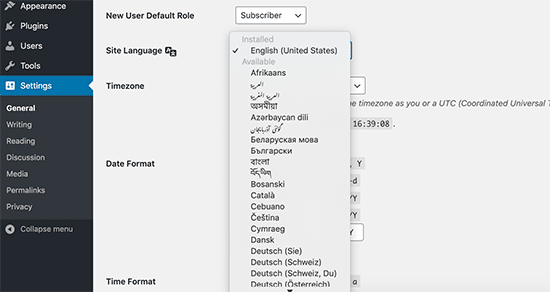
De flesta populära teman och plugins finns också tillgängliga på flera språk, och utvecklare av teman och plugins söker aktivt hjälp med att översätta sina paket till andra språk.
Alla dessa ansträngningar gör WordPress till en utmärkt plattform för att bygga en webbplats på ett annat språk eller en flerspråkig webbplats.
Joomla
Joomla levereras med inbyggd kapacitet att hantera en flerspråkig webbplats utan att installera någon tillägg. Gå helt enkelt till språkhanteraren, lägg till ett innehållsspråk och börja skapa flerspråkigt innehåll på din webbplats.
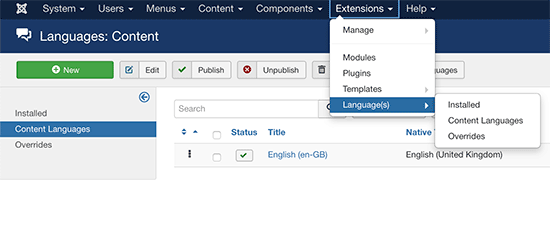
Översättningar finns också tillgängliga för administrationsgränssnittet på många språk och kan enkelt installeras från administrationsområdet.
Drupal
Drupal har inbyggt stöd för att hantera webbplatser som inte är på engelska eller är flerspråkiga. Du behöver aktivera modulerna locale och content translation. Därefter kan du lägga till språk för webbplatsen och administrationsgränssnittet från Drupals konfigurationssektion.
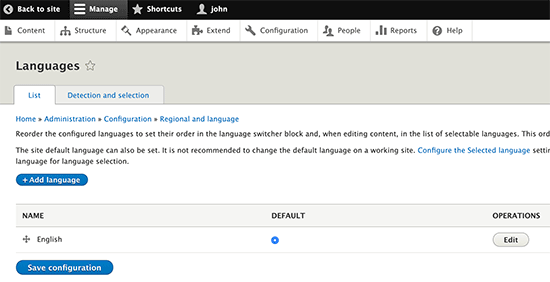
Vinnare: Lika – Alla tre stöder flerspråkiga webbplatser och finns tillgängliga på flera språk.
Säkerhet
Säkerhet är en mycket viktig faktor när man väljer ett CMS för sin webbplats. Nästan alla webbplatser på internet är sårbara för säkerhetshot.
WordPress
Som det mest populära CMS i världen är WordPress-baserade webbplatser ofta måltavlor för hackare. WordPress är dock byggt på mycket säker kod och svarar mycket snabbt på säkerhetsbrister.
WordPress har också en automatisk uppdateringsmekanism som gör att WordPress-webbplatser automatiskt kan uppdateras när en ny säkerhetsuppdatering släpps.
WordPress-webbplatser kan ytterligare säkras med automatiserade säkerhetskopior, tvåfaktorsautentisering och andra säkerhets bästa praxis för WordPress.
Det finns också en inbyggd mekanism för att visa uppdateringar för WordPress-teman och plugins. Detta gör det möjligt för teman och plugin-utvecklare att snabbt reagera på eventuella säkerhetsbrister.
Joomla
Joomla är mycket lik WordPress när det gäller säkerhet. De svarar aktivt på alla säkerhetsbrister och är mycket snabba med att åtgärda dem. Att underhålla en webbplats och installera uppdateringar är dock fortfarande upp till användaren.
Det finns tillägg tillgängliga för att säkerhetskopiera din Joomla-webbplats. Du kan också stärka din Joomla-webbplats säkerhet genom att följa samma bästa praxis som för WordPress.
Drupal
Drupal tar säkerhet på mycket stort allvar. De publicerar säkerhetsbrister på sin egen webbplats så fort de upptäcks och åtgärdas. Det finns en uppfattning att Drupal är säkrare eftersom man inte hör talas om att Drupal-webbplatser hackas lika ofta, men det kan bero på att det inte är lika populärt som Joomla eller WordPress.
Vinnare: Oavgjort – Alla tre följer korrekta säkerhetsstandarder.
Slutsats:
Drupal, Joomla och WordPress är alla fantastiska innehållshanteringssystem. Drupal och Joomla har många fler inbyggda funktioner än WordPress.
Däremot slår WordPress dem med sin användarvänlighet, enorma globala community, plugins och teman. Vi anser att de flesta användare som inte är utvecklare skulle finna det mycket enklare att bygga med WordPress än med Joomla eller Drupal.
Med över 59 000 WordPress-plugins kan du lägga till nästan vilken funktion som helst eller bygga vilken typ av webbplats som helst som du vill (utan att skriva kod).
Övergripande vinnare: WordPress
Hur du kommer igång med ditt favoritsystem för innehållshantering (CMS)
Oavsett om du väljer WordPress, Joomla eller Drupal, behöver du ett domännamn och webbhotell för att skapa en webbplats.
Lyckligtvis har alla tre av dessa topp CMS-program ganska liknande krav, vilket innebär att alla ledande webbhotell stöder dem.
Vi rekommenderar att du använder antingen Bluehost eller SiteGround. De är båda bland de största hostingföretagen i världen och specialiserar sig på hosting av WordPress-, Joomla- och Drupal-webbplatser.
För fler rekommendationer, se vår kompletta webbhotellsguide för nybörjare.
Om du börjar med WordPress, se då vår nybörjarguide om hur man skapar en webbplats med steg-för-steg-instruktioner.
Vi hoppas att den här artikeln hjälpte dig att jämföra WordPress vs Joomla vs Drupal, för att hitta det bästa CMS:et för din webbplats. Du kanske också vill se vår jämförelse av WordPress vs. Blogger eller vår presentation av populära webbplatser som använder WordPress som CMS.
Om du gillade den här artikeln, prenumerera då på vår YouTube-kanal för WordPress-videoguider. Du kan också hitta oss på Twitter och Facebook.





mohadese esmaeeli
Visst, jag har ingen avsikt att engagera mig i något CMS-krig. Men baserat på min erfarenhet (eftersom jag arbetade med Joomla i 3 år) kan WordPress ge bättre feedback inom alla områden för stora webbplatser. Vanligtvis, och bevisat, använder mer än 60 % av webbplatserna i världen WordPress, medan mindre än 15 % använder Joomla. Generellt sett har WordPress en vacker värld för sig själv. Naturligtvis måste vi, innan vi väljer ett innehållshanteringssystem, ta hänsyn till webbplatsens natur. Ändå, med tanke på de fantastiska framsteg som WordPress har gjort och de plugins som utvecklats av stora globala företag, kan WordPress nu användas för alla typer av webbplatser.
Jiří Vaněk
Jag provade alla tre redaktionella systemen och från min egen erfarenhet är wordpress bra, särskilt för nybörjare att lära sig hur man arbetar med webbplatsen och förstå grundprinciperna. Wordpress verkar för mig vara det mest mångsidiga och viktigast av allt, vid problem har det en enorm användarbas som gärna hjälper till att lösa problemet gratis.
Priya Sinha
Tack för inlägget, bra information om WordPress vs. Joomla vs drupal vilken som är bäst... det är verkligen hjälpsamt. Jag kommer att rekommendera det till andra.
WPBeginner Support
Glad you found our comparison article helpful!
Admin
Tom Hardy
Bra information! Baserat på min erfarenhet, enligt min mening, är WordPress det enklaste innehållshanteringssystemet som är mycket anpassningsbart. Å andra sidan är Drupal komplext, men det är bäst för att skapa avancerade webbplatser; det är också ett mycket säkert CMS. Joomla ligger mellan dessa två CMS när det gäller anpassningsbarhet, användarvänlighet och säkerhet.
WPBeginner Support
Thanks for sharing your opinion
Admin
Duane Hamann
Jag tycker att den här artikeln stämmer. För den okunnige som vill sätta upp en respektabel hanterad webbplats är Wordpress det bästa alternativet. Men det har begränsningar som Joomla har övervunnit. För någon som är skicklig inom CMS-utveckling rankas Joomla som nummer 1 för sin flexibilitet med anpassade komponenter, det är mycket mer tekniskt så för den som letar efter något anständigt och lätt att förstå, vinner Wordpress. Det lyser dock inte upp Wordpress jämfört med Joomla. Allt som sägs är att för dem utan utvecklingsfärdigheter är Wordpress bäst. För dem som utvecklar PHP-applikationer är Joomla mer anpassningsbart och flexibelt, så allt beror på individens färdigheter.
Vast
Jag har skapat många webbplatser och har använt alla tre konkurrenterna. Jag tycker att Joomla är mest mångsidig och smidig att använda, särskilt för större komplexa webbplatser.
Men även för små webbplatser är Joomla superenkel att använda.
Jag tycker att WordPress är mer lämpligt för bloggning och för kommentarer och det fungerar bra för mindre webbplatser. Det är bara inte lika lätt att finjustera som Joomla.
Ronald
Om du vill ha något som inte är komplext och begränsat för en webbsida, använd WordPress.
Om du vill ha något komplext och inte begränsat för att utveckla webbplatser, använd Drupal.
Drupal är bättre!
Okanime
Hur man känner igen en kille som är “bra på datorer” och utger sig för att vara webbdesigner – när han säger att han ska bygga din webbplats med ett WordPress CMS. Om du tycker att Joomla är svårt att använda eller underhålla, seriöst, du borde sluta använda någon form av elektronisk enhet. Det är din skyldighet att göra oss alla den tjänsten.
Mark
En webbplats om Wordpress säger att Wordpress är bäst ... Vilken överraskning ...
Jiten
Jag använde Wordpress sedan 2010. Som webbdesigner designar och levererar jag alltid webbplatser i WP men för några år sedan blev några webbplatser hackade. Kom ihåg att när din webbplats väl har blivit hackad finns det bara en lösning för att helt ta bort infektionen: "RADERA ALLT" eftersom när du väl har blivit attackerad kommer inget plugin att rensa allt.
Nu byter jag från WP till Joomla.
Okanime
Joomla är vackert. Jag förstår inte varför det får dåligt rykte. Joomla 3.x är nu mil bättre än Wordpress i alla avseenden.
Duarte
Att jämföra Drupal och Wordpress är som att jämföra en bil med en båt, eller äpplen med lök. De är båda bäst inom sitt eget område. Beroende på olika faktorer bör du använda det ena eller det andra, men det bör vara för en annan artikel.
Jag använder båda och för mig är en sak som WP inte är så bra på plugins. Det är sant att WP har tusentals bra plugins, men de flesta av dem är upprepade i funktionalitet och andra är fremmium, vilket innebär att du måste betala om du vill ha hela produkten. Dessutom tenderar de att vara färdiga lösningar utan skalbarhet i åtanke. Och samma sak händer med teman.
Drupal har en strikt policy att bidragna moduler inte får upprepas och de är alla gratis (Open Source), inga freemium-moduler eller teman är tillåtna. Modulerna i Drupal är mer som baser så att du kan utveckla dina funktionaliteter med din egen kod eller med andra moduler. En stor del av drupal-modulerna har inga synliga utdata, de fungerar bara som backend-kopplingar mellan funktionaliteter.
Kan inte prata om Joomla. Ingen erfarenhet av det.
Mark
Även om WP kan ha det absolut största utbudet av teman och plugins, är de flesta av deras teman rena repetitioner och dubbletter, tråkiga i allmänhet och skapade med mycket lite kreativitet.
Samma sak gäller WP-plugins. För att göra det ännu värre måste du argumentera med en armé av plugin-utvecklare som skyller på varandra, där var och en försäkrar att din trasiga webbplats är resultatet av ett “annat” installerat plugin, inget att göra med dem.
Har du hört talesättet; "för många kockar förstör soppan"?
Det gäller till 100 % för WP.
Jag skulle aldrig använda WP, inte ens om det vore det enda kvarvarande CMS:et på planeten. Fullt av buggar, inkompatibla plugins, enorma säkerhetsbrister, livlösa designer och en miljon inkompetenta kodhackare som alla låtsas vara "professionella webbprogrammerare".
Sam
Jag håller helt med dig.
Paul
Jag har aldrig haft några säkerhetsproblem med WordPress, och angående "livlösa designer" – om du har relevanta färdigheter (eller anlitar en kompetent designer) är den enda gränsen för hur din WordPress-webbplats ser ut din fantasi.
Håll dig till väletablerade (och stödda) teman och plugins, så kan du inte riktigt gå fel.
Bizzo
Du kan skapa en ganska snygg webbplats med Wordpress, men det som blir ganska tydligt ganska snabbt är att det är en blogg och det är nästan omöjligt att komma förbi det. Om du vill ha en blogg, toppen! Om inte, kommer det att krävas enormt mycket tid och energi för att skräddarsy det till att vara något annat än en typisk blogg.
Förresten, någon nämnde WNBA som wordpress. Notera, NBA.com är Drupal.
Nikola
Jag kan hålla med om att WordPress är mer populärt än Joomla, men inte att det är bättre.
WordPress popularitet beror på en negativ kampanj som förs mot Joomla.
Internet svämmar över av artiklar som denna där vissa personer pratar rent nonsens och lögner om Joomla.
Med vänliga hälsningar
Fredag
För de som vill migrera från Drupal till WordPress kan de använda det kostnadsfria verktyget FG Drupal till WordPress
PATRICK MUSUMINA M.
WordPress erbjuder mer användargränssnitt än Drupal och Joomla
Niels Klint
Absolut fel
Nikola
Jag håller med.
Alex
Inte för en kund. Vi utvecklar alltid anpassade teman med olika CMS och kunderna föredrar alltid WordPress för att redigera sin webbplats. Eftersom det är lättare för dem att förstå tack vare användargränssnittet.
Frank Yusuf
Wp är ett bra innehållshanteringssystem, det förenklar webbdesign med sina mångsidiga teman och plugins. Förr i tiden var webbdesign en herkulisk uppgift men med Wordpress kom kod att bli poesi.
greg
WordPress does an excellent job at offering a GOOD PLATFORM to build a MULTILINGUAL site. It does NOT SUPPORT multiple languages out of the box, but… Yes, awesome platform!
Rahul
wow... efter att ha läst den här handledningen borde jag sätta upp wordpress för min blogg
waqas
jag använder joomla och sedan yt ramverk i joomla. jag tror att för avancerade webbplatser är joomla bättre på grund av enkelheten att skapa nya modulpositioner och andra anpassningar med teman och moduler också. även om wordpress är bättre för små bloggar. men i joomla om du är proffs tror jag att du kan skapa ännu bättre bloggar i joomla
Joris
Jag håller med, tusen fler alternativ för många olika bloggtyper på en enda webbplats utan någon kodning. Prova det i WordPress och du behöver skapa flera teman eller använda sidbyggare.
För WordPress behöver du mycket mer kunskap för att anpassa inställningar i bloggar.
Out of the box och media är wordpress min vinnare. Flerspråkighet finns inte i wordpress och WPML är en smärta i röven
Darren
Jag har använt ett antal CMS:er över tid och det absolut sämsta jag någonsin hittat var WordPress. Jag är mycket förvånad över att det kom upp i topp och ännu mer förvånad över att det kom upp högt för säkerhet.
Jag har hittat ett antal dumma säkerhetsproblem med WordPress – till exempel om du inte vet vad du gör och bygger en webbplats kan någon enkelt lägga till några GET-variabler i slutet av WordPress-webbplatser och enkelt använda det för att hämta användarnamnet för webbplatsägaren – okej, lösenordet är fortfarande dolt men alla hackare är halvvägs där.
Jag använder normalt Joomla för webbdesign eftersom jag tycker att det är enkelt, men å andra sidan tillbringade jag många år med att lära mig C++ på universitetet och har omvandlat den kunskapen till PHP.
När det gäller Drupal, lär jag mig bara lite Drupal just nu och jag måste erkänna att vissa delar av det ser riktigt bra ut. Det enda dåliga jag hittar är cachen när man försöker designa en mall, cachen kommer i vägen lite. Det verkar också konstigt att ha underteman separerade från huvudteman.
Jag stötte nyligen på en mardröm med det adaptiva temat när jag ville modifiera menykoden lite, så jag kopierade vad jag trodde var menykoden (det var adaptivetheme_menu_tree och adaptivetheme_menu_tree (du skulle gissa att det är det som skapar menyn med tanke på att dess namn innehåller ordet MENY!!)), det visade sig inte göra någonting – jag vet inte ens vad den delen av koden gör. Istället upptäckte jag att den blandar den primära menyn med adaptivetheme_links som också används av flera andra funktioner – och det fanns inte ens något ordentligt sätt att separera dem så jag var tvungen att lista ut det genom att fråga vad rubrikens ID är och om det är primary_menu måste det vara menyn jag letar efter.
Tyvärr är jag dock på ett företag som har en webbplats baserad på Drupal och tror att Drupal är det bästa sedan skivat bröd, så jag måste försöka arbeta med det. Förhoppningsvis ju mer jag använder Drupal, desto mer kommer jag att förstå det – jag har redan skapat en genvägslänk till mappen sites/all eftersom det störde mig att behöva gå igenom alla dessa kataloger bara för att komma dit jag kan redigera (i Joomla är det bara rakt in, in i mallmappen och du har alla dina teman och överlappningar som väntar där för dig!)
Heidi
Hej Darren. Det låter som att du har stor erfarenhet av Joomla och detta är lite vid sidan av ämnet... Jag har dock en Joomla 1.5-webbplats som behöver uppdateras till ett responsivt tema för en närliggande ideell organisation. Jag är mer designer än webbprogrammerare. Några förslag på bästa sättet att göra detta – eller några rekommenderade do’s and don’ts innan jag börjar?
Tack.
Syahir Roslan
Så vitt jag vet om Joomla, är det riktigt svårt om du uppgraderar från Joomla 1.5 eller 2.5, det är inte omöjligt men det kommer att lyckas med många fel så jag föreslår att det är bäst att migrera innehållet och använda den senaste Joomla eftersom den stöder mer responsiva teman och moduler. Och även Wordpress är det värsta och har inte provat Drupal än.
Darren
Hej Heidi
Jag har inte använt Joomla 1.5 på många år, de flesta av mina webbplatser är baserade på Joomla 3.x eftersom det är möjligtvis det mest responsiva av dem.
Ditt bästa alternativ om du vill göra en webbplats mer responsiv är att titta på Boostrap API och inkludera Bootstrap CSS, eftersom ganska många responsiva menyer och kolumner kan skapas med bootstrap och de konverteras automatiskt för att se bra ut på både mobiltelefoner och datorskärmar.
När det gäller att gå från en till en annan – jag skulle starkt rekommendera att säkerhetskopiera hela din webbplats innan du börjar (inklusive SQL-databasen), och kanske bygga den nya webbplatsen på en testplats först innan du skriver över den befintliga webbplatsen (till exempel skapa den i en temporär mapp först, se till att allt fungerar och flytta sedan webbplatsen till huvudmappen – och glöm inte att ändra configuration.php med de nya platsdetaljerna – och om du har använt en annan SQL-server ändra även SQL-serverdetaljerna i configuration.php även om SQL-inställningarna inte bör behöva ändras om du bara byggde den i en separat mapp på samma värd).
Titta också på att använda den senaste utgåvan av Joomla – för närvarande är det 3.6.2 – eftersom det ger dig den senaste versionen med de senaste säkerhetsproblemen åtgärdade och framtida uppgraderingar bör vara enklare, från och med Joomla 3 har de gjort uppgraderingsprocessen ganska enkel och lätt att behålla befintlig data, men att gå från 1 till 3 kan innebära att du måste kopiera och klistra in det mesta av den ursprungliga webbplatsen om du vill att den ska ha samma data.
Scott...
Självklart kom WordPress ut på topp, det är en nybörjarwebbplats för WordPress, du förväntade dig egentligen inte att recensionen skulle vara objektiv. Det är i princip ett säljsnack där bara de goda punkterna utarbetas.
Brian
Jag har använt både Wordpress och Joomla under lång tid nu och Joomla, trots att det har några trevliga funktioner jämfört med Wordpress, lider kraftigt av bristen på bra tillägg (särskilt gratis). Ibland tar det mig timmar att hitta rätt och få det att fungera, vilket aldrig händer i Wordpress där jag kan söka och när jag hittar det finns det bra support och dokumentation för det. För att inte tala om att vissa funktioner inte fungerar så bra i Joomla, som att ladda upp bilder till galleriet kan vara ett riktigt problem. Därför är det mer en fråga om tur än ansträngning att få en Joomla-webbplats att se ut och fungera som du vill, men när du väl kommer dit fungerar det bra, till och med tvåspråkigt stöd är utmärkt. Dessutom kan användning av publiceringstillägg som K2 komplicera saker, mycket. Jag skulle definitivt rekommendera Wordpress för nybörjare och Joomla för mer avancerade användare och erfarna webbdesigners.
Niels Klint
"Därför är det mer en fråga om tur än ansträngning att få en Joomla-webbplats att se ut och fungera som du vill, dock"
Absolut fel – men ju fler möjligheter det finns i ett system, desto mer måste du kunna utnyttja möjligheterna
Petr
Jag brukade bygga webbplatser med Wordpress och Joomla! men oftast när jag var klar med en webbplats byggd med Wordpress, bad kunden om någon ny specifik funktion som inte enkelt kunde implementeras i WordPress (ibland var det inte möjligt) så då byggde jag om webbplatsen i Joomla!. Även om Wordpress är populärt, enkelt och lätt använder jag mest Joomla! på grund av dess komplexitet och möjlighet att enkelt och kraftfullt anpassa koden (eftersom det finns bra och moderna kodtekniker som enkelt kan utökas). Men jag gillar dem båda – Wordpress för riktigt enkla webbplatser (bloggar) och Joomla! för komplexa webbplatser.
bill
Du sa "Nästan varje webbplats på internet är sårbar för säkerhetshot.". Jag skulle säga att du borde revidera det uttalandet och säga ATT VARJE webbplats är sårbar för säkerhetshot. Om den har en IP-adress, då är den sårbar.
Bucur
Jag har använt alla de tre stora systemen (WP, Drupal och Joomla) i en företagsmiljö (stor).
Ur ett *användar*-perspektiv hatade jag Drupal med tusen solars hetta. Jag tyckte att det var klumpigt, restriktivt (och inte på ett bra sätt) och ibland helt enkelt förvirrande. Naturligtvis medger jag att jag var partisk när jag började använda det eftersom jag redan hade använt J! och WP omfattande och även ett annat "riktigt" enterprise CMS och förväntade mig en liknande upplevelse.
Och, som någon som tidigare arbetade för en statlig myndighet som antog Drupal – det var inte för att det var säkert, det var för att "Vita huset använder det" och det var "gratis", och båda dessa skäl är så bristfälliga att de är löjliga. *ögonrullning*.
Efter min erfarenhet av att använda Drupal på stora internet- och intranätsidor skulle jag aldrig seriöst överväga att använda det igen. Direkt ur lådan och även efter omfattande modifieringar och tillägg kunde det inte hantera tidsinställd publicering, man kunde inte arbeta på en utkastversion av en sida (och spara utkastet) och så många andra små användarproblem som bara gjorde mitt webbplatsliv eländigt.
Efter att ha använt WP de senaste åren är det dock mitt system för publiceringssidor, främst för att det är så lätt att lära andra (icke-tekniska) användare hur man använder det och säkerheten kan till stor del hanteras om man är lite försiktig från början.
Paddy
Hej, jag har varit front/backend-programmerare för personliga projekt i flera år - och jag funderar nu på att börja skapa webbplatser för kunder. Att tillåta "icke-tekniker" att uppdatera webbplatserna efter leverans är lite nytt för mig. Det började verkligen sjunka in efter att jag skapat en webbplats åt en vän och hon nonchalant sa "hur uppdaterar jag den?". Har jag rätt i att anta att WP, J! och Drupal är lämpliga för professionell webbplatsleverans till kunder? Om det delvis beror på att de är gratis, finns det några andra som du skulle rekommendera att använda, om än till en kostnad?
K Johnson
Hmm… en sajt som heter wordpress beginner som deklarerar wordpress som vinnare i alla kategorier utom en. Inte särskilt objektivt enligt min mening.
Brooks
När du tittar på funktionell skalbarhet och arkitekturen för var och en av de granskade produkterna, finns det ingen jämförelse. Ingen.
WP var ursprungligen utformat som ett enkelt bloggverktyg, och reviderades sedan för att hantera CMS-liknande funktioner:
– De olika populära pluginsen för att hantera grundläggande redigering, struktur och utökade CMS-funktioner överlappar och krockar ofta med varandra.
– Den strukturella skalbarheten hos WP-sidor och bloggar är en funktion av plugins, inte den underliggande WP-arkitekturen.
– Det är smärtsamt uppenbart att många av WP:s admin-, design- etc. funktioner lades till i efterhand. Den underliggande bloggcentrerade arkitekturen gör det mycket svårt att lägga till CMS-funktioner på ett intuitivt sätt.
Drupal, å andra sidan, designades från grunden för att skalas funktionellt. Den uppenbara avvägningen är inlärningskurvan.
Men, enligt min erfarenhet, överstiger den förlorade produktiviteten vid arbete med WP:s svaga arkitektur (särskilt vid försök att implementera mer komplex funktionalitet) eller hantering av konflikterande tredjepartskomponenter, Drupals inlärningskurva.
Så, kanske en bättre kvalificering när man gör denna jämförelse skulle vara:
– Om du behöver ett enkelt bloggverktyg är WP förmodligen det mest lämpliga.
– Om du behöver ett robust CMS-verktyg är Drupal det mest lämpliga.
Enligt min mening är Joomla en kompromisslösning – inte den enklaste för grundläggande bloggning och webbdesign, men inte den mest robusta för CMS-funktioner.
Ville bara säga...
Keith
Problemet jag har upplevt alltför ofta med Wordpress är att, även om det helt klart har fler plugins än de andra, så är så många av dem, även premium-plugins, utvecklade med en mentalitet av 'ja, det här uppfyller kravet på ett ungefär', och 'Om de vill att det ska göra vad de verkligen vill, måste de betala oss mer pengar.' Jag ser detta gång på gång med en nuvarande Wordpress/WooCommerce-lösning som jag arbetar med för en kund. De vill ha det i Wordpress. Jag kommer att ge dem det i Wordpress, men det borde inte vara så här frustrerande.
Mustafa
Tack för denna jämförelse, mycket användbart.
Edujobsbd
Jag tycker att WP är bättre än tre.
SREERAJ
Tack för artikeln.
Jag kände mig verkligen tvingad att lägga till denna kommentar, Wordpress är SÄMRE när det gäller säkerhet och tydligt är Drupal vinnaren där.
Vladus Wizard
Hej. Den här artikeln är författarens subjektiva åsikt. Alla dessa CMS har för- och nackdelar. Jag kan inte svara på frågan om vilket CMS man ska använda. Det beror på det specifika fallet.
Fordiy
För professionellt bruk måste det vara Joomla. Jag blev så besviken när jag först installerade WordPress. Faktum är att WordPress INTE är bra för kommersiella webbplatser.
Atanas
Varför?
Mervink
Intressant, varför skulle du säga att det inte är bra för kommersiellt bruk, jag menar, många digitala byråer föredrar att arbeta i WP, trots säkerhetsfaktorn bryr jag mig verkligen inte om att använda det för kommersiella ändamål.
Amanda
Om jag får, även om jag inte är den mest erfarna användaren, har jag gjort min research och, som har påpekats i andra kommentarer, WordPress designades för att vara ett bloggverktyg och inget mer. Det var INTE avsett för handel. De har nu plugins för att kompensera för den bristen på funktionalitet, men att jämföra det med ett CMS som har den funktionaliteten direkt ur lådan, som Drupal eller Duda, kommer WordPress uppenbarligen att förlora. Om det kräver en tilläggsmodul är det nästan en garanti att det helt enkelt inte kommer att fungera lika bra som om det vore en del av grundkoden. Det finns verkligen många kommersiella webbplatser som använder WordPress, men som en annan kommentator upplever, är det ofta för att det efterfrågades av en företagare som inte vet bättre och det gör livet betydligt svårare än det behöver vara för utvecklaren. Kommer utvecklaren att kunna skapa en kommersiell webbplats med WordPress? Visst. Kommer det att vara lika enkelt som det borde vara? Förmodligen inte (även om det, när du väl är van vid det, troligen inte kommer att verka som en stor sak, särskilt om du inte har använt ett annat CMS för ändamålet). Och de kommer vanligtvis att ta mer betalt av sin kund för besväret.
Mickaël andrieu
Hej, trevlig artikel.
Dessutom tror jag inte att vi bara ska överväga de tre stora CMS:en när vi ska bygga en webbplats: det finns ett CMS för varje specifikt behov.
Jag arbetar till exempel med ett nytt CMS baserat på Symfony-komponenter och ett kraftfullt redigeringssystem på sidan: BackBee
So, don’t be shy and check all theses new “next gen” CMSes
Allan Philip
Tack för upplysningen om de 3 CMS-plattformarna. Jag har alltid använt Wordpress på grund av enkelheten att sätta upp, redigera och installera plugins på en blogg. För mig är Wordpress kungen av bloggplattformar på grund av enkelheten att installera och skapa bloggar.
EMM
Jag började min karriär inom webbutveckling med Dreamweaver/HTML.. Wordpress var vid den tiden en bra bloggplattform, men att skapa en webbplats med det var mycket svårt. Jag provade först Joomla av alla tre, men det var så intuitivt att jag inte kunde greppa CMS och hur det fungerade. Sedan föreslog en vän Drupal, som jag använde uteslutande i mer än 3 år. Jag älskade flexibiliteten och kraften i Drupal, och kontrollen jag hade över innehållstyper, vyer, behörigheter, etc… Anpassning och uppdatering är de två gissel i mitt liv, dock, när det gäller Drupal. Om dessa två saker var lika lätta som Wordpress, skulle jag förmodligen aldrig lämna Drupal eftersom jag kan göra så mycket mer med det.
Sedan, för cirka 3 år sedan, anställdes jag för att arbeta med några Wordpress-webbplatser – sparkandes & skrikandes, bör jag tillägga – men när jag såg att det hade kommit långt, började jag använda det för de flesta webbplatser jag bygger, på grund av enkelheten att uppdatera och anpassa. Jag tycker fortfarande att säkerheten är lite skum, men i verkligheten verkar inget CMS vara 100 % säkert.
Jag gillar Drupal bättre, men slutar med att använda WP på grund av de saker jag nämnde ovan.
Shannon McNaron
Jag tror att du glömde att överväga vilken som faktiskt kan hantera stora mängder innehåll. Om en webbplats är liten och stillastående kanske Wordpress är bäst, men när den växer tror jag att de kommer att flytta till de större aktörerna, så varför inte börja lära sig och arbeta med rätt CMS från början?
Bruce
Jag antar att ingen berättade för newyorker.com och thenextweb.com att WordPress inte kan hantera stora mängder innehåll.
Det där är bara 2 exempel på webbplatser med mycket innehåll och hög trafik som använder WordPress framgångsrikt
edvard eidem
Som en professionell webbutvecklare i många år. Låt mig uttrycka min åsikt.
Jag håller med om att WP är det enklaste CMS av de tre, men en mycket viktig aspekt saknas helt: SÄKERHET. Om du har ett stort företag som är 100 % beroende av din webbplats måste du verkligen skärpa säkerheten på alla möjliga sätt. Även då är WP inte mer än 95 % säkert.
Säkerhet är en av mina största bekymmer och för min största kund (ett stort mediehus) kommer jag aldrig någonsin att överväga WP. Jag använder mindre kända CMS som inte finns på hackarnas listor.
En av mina tidigare kunder blev hackad trots en PRO-brandvägg och ett lösenord med 13 tecken.. Det gjordes via ett tillägg. Tilläggen och mallarna är mycket ofta skyldiga.
Joomla är förresten inte heller säkert. Hitta något annat. Min röst för säkerhet går till CMS Made Simple. Jag har aldrig ens hört talas om en CMS Made Simple-webbplats som blivit hackad.
Dessutom är en omröstning från en WP-webbplats som denna mycket partisk, så du behöver verkligen söka recensioner från en icke-partisk webbplats.
Med vänliga hälsningar E, Norge
edvard eidem
Jag kan inte redigera inlägget, så jag får lägga till en kommentar själv.
Säkerheten saknas inte helt, mitt fel.
Min poäng är att WP inte är tillräckligt säkert direkt ur lådan. Joomla inte heller.
Ö. Norge
Joris
Jag har över 100 joomla-sajter att hantera, 2 gånger blev jag hackad. 1 var inte på min server och föråldrad, den andra var föråldrad i 7 år.
Joomla är säkert men att använda plugins kan orsaka problem (:
Med WordPress har jag haft några hackade webbplatser att fixa och de var alltid föråldrade (:
Santhoshveer
wordpresss är bäst någonsin Vår bästa cms vi kan skapa en webbplats som bloggar, nedladdningssidor, kundvagnar, sociala medier-webbplatser med anpassad kodning, plugins och teman
Rikáryo Mourão
Använd de 3 CMS:en och det som alltid ger mig problem är Wordpress, inklusive uppgraderingsprocessen är alltid komplex i WP och kunder har bett mig Crackers åsikt att lösa problem och Joomla! idag detta intakt som det säger säkerhetsintrång.
Tänk bara att resultatet var partiskt.
Zaki Honey
tack för den stora jämförelsen, jag har en fråga, varför vill nästan alla företag använda joomla istället för wordpress? jag ser det mycket när de letar efter programmerare eller någon att göra en webbplats åt dem, de vill ha joomla?
flankerp
Jag tror att eftersom du i Workdpress inte kan hantera policyinställningar, kan du inte ha olika åtkomsträttigheter för användargrupper. Jag använder både WP och Joomla 3. För små enkla sajter är WP bättre eftersom det är mycket snabbare. Men om du behöver hantera åtkomsträttigheter för olika grupper och skapa policyer, då är Joomla svaret.
Enligt min mening är detta två olika produkter. WP är för bloggning och Joomla är det riktiga CMS-systemet. De är olika och du kan inte jämföra. På båda kan du få vissa gemensamma drag men de är olika och enligt min mening kan du inte säga att den ena är bättre än den andra.
WPBeginner Support
WordPress levereras med ett robust användarrollhanteringssystem. Det kan enkelt utökas med hjälp av ett plugin och utvecklare kan skapa vilken kombination av behörigheter de behöver.
Admin
Silvio Jesus
Heh, jag har uppenbarligen förväntat mig att en wp-dedikerad webbplats skulle göra wp till vinnaren av en sådan jämförelse.
Även om jag håller med om nästan allt i artikeln, finns det ingen oavgjord i det flerspråkiga aspektet. WP, ur lådan, ger inte användaren en flerspråkig plattform, och bara det faktum att du måste skaffa ett plugin för att göra det gör det till en förlorare i den kategorin.
Så... Artikeln var ganska korrekt tills dina "wp-fanboy-känslor" grumlade ditt omdöme.
PS: Jag tycker att wp är bättre än de tre, men det ursäktar inte partiska artiklar.
Med vänliga hälsningar,
S.J.
Fernando
Vad sägs om skalbarhet? Jag hade Wordpress-sajter som inte kunde hantera mycket trafik. Kan du säga vilken som är bäst för skalbarhet och göra en ultimat videoguide med alla steg för att skapa en riktigt, riktigt skalbar Wordpress-sajt, en som vi kan använda i en TV-reklam och få tusentals klick samtidigt?
Bästa
nero av Intuitiv Design
Jag håller med Fernando om skalbarhet. Jag gillar också recensionen eftersom den fokuserar på icke-utvecklare och är mycket tydlig. Jag skulle dock ha älskat en sektion om fördelarna med var och en. Wordpress vinner i de sektioner du väljer; men som utvecklare (och jag har installerat och lekt med alla plattformar; men har inte aktivt använt dem alla för utveckling – främst wp-utveckling just nu), skulle jag älska att veta fördelarna och styrkorna hos de andra två plattformarna och när de skulle vara värda att titta på för utveckling av specifika webbplatser.
Tack,
Tamer
Jon
En webbplats som inte klarar mycket trafik upplever hostingproblem, inte ett WordPress-problem. Exempel på WordPress-webbplatser som får massor av trafik: WNBA-webbplatsen, Mashable, The San Francisco Examiner, Garth Brooks webbplats, Mercedes Benz, massor mer här: https://wordpress.org/showcase/archives/.
John Lewis
Jag håller med.... Eller så är det ett lokalt problem. Dvs. din internetanslutning.
Klippa
Fernando, skalbarhet är till stor del ett resultat av hostingmiljön (serverresurser, bandbredd, lastbalansering, etc.) och inte själva webbplatsmjukvaran. Jag tvivlar på att allt det kommer att täckas i en enda video.